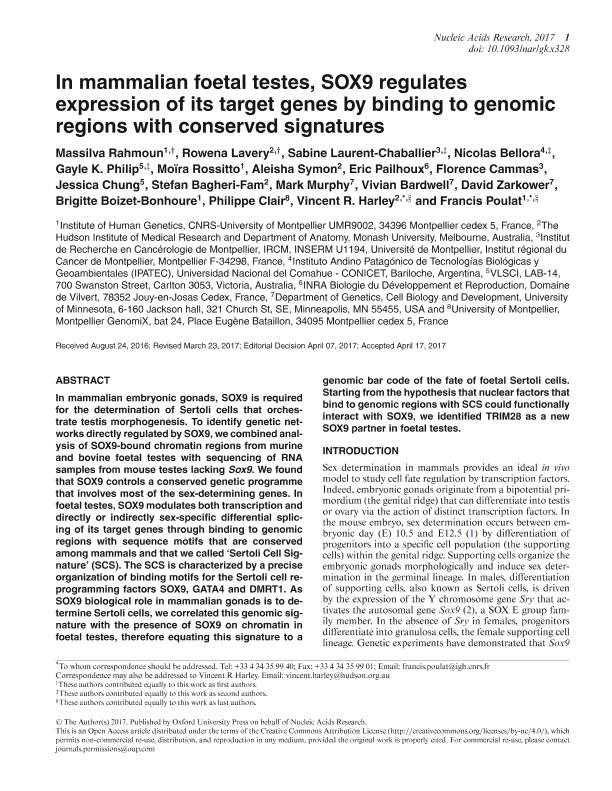Artículo
In mammalian foetal testes, SOX9 regulates expression of its target genes by binding to genomic regions with conserved signatures
Rahmoun, Massilva; Lavery, Rowena; Laurent-Chaballier, Sabine; Bellora, Nicolás ; Philip, Gayle K.; Rossitto, Moïra; Symon, Aleisha; Pailhoux, Eric; Cammas, Florence; Chung, Jessica; Bagheri-Fam, Stefan; Murphy, Mark; Bardwell, Vivian; Zarkower, David; Boizet Bonhoure, Brigitte; Clair, Philippe; Harley, Vincent R.; Poulat, Francis
; Philip, Gayle K.; Rossitto, Moïra; Symon, Aleisha; Pailhoux, Eric; Cammas, Florence; Chung, Jessica; Bagheri-Fam, Stefan; Murphy, Mark; Bardwell, Vivian; Zarkower, David; Boizet Bonhoure, Brigitte; Clair, Philippe; Harley, Vincent R.; Poulat, Francis
 ; Philip, Gayle K.; Rossitto, Moïra; Symon, Aleisha; Pailhoux, Eric; Cammas, Florence; Chung, Jessica; Bagheri-Fam, Stefan; Murphy, Mark; Bardwell, Vivian; Zarkower, David; Boizet Bonhoure, Brigitte; Clair, Philippe; Harley, Vincent R.; Poulat, Francis
; Philip, Gayle K.; Rossitto, Moïra; Symon, Aleisha; Pailhoux, Eric; Cammas, Florence; Chung, Jessica; Bagheri-Fam, Stefan; Murphy, Mark; Bardwell, Vivian; Zarkower, David; Boizet Bonhoure, Brigitte; Clair, Philippe; Harley, Vincent R.; Poulat, Francis
Fecha de publicación:
07/2017
Editorial:
Oxford University Press
Revista:
Nucleic Acids Research
ISSN:
1362-4962
Idioma:
Inglés
Tipo de recurso:
Artículo publicado
Clasificación temática:
Resumen
In mammalian embryonic gonads, SOX9 is required for the determination of Sertoli cells that orchestrate testis morphogenesis. To identify genetic networks directly regulated by SOX9, we combined analysis of SOX9-bound chromatin regions from murine and bovine foetal testes with sequencing of RNA samples from mouse testes lacking Sox9. We found that SOX9 controls a conserved genetic programme that involves most of the sex-determining genes. In foetal testes, SOX9 modulates both transcription and directly or indirectly sex-specific differential splicing of its target genes through binding to genomic regions with sequence motifs that are conserved among mammals and that we called 'Sertoli Cell Signature' (SCS). The SCS is characterized by a precise organization of binding motifs for the Sertoli cell reprogramming factors SOX9, GATA4 and DMRT1. As SOX9 biological role in mammalian gonads is to determine Sertoli cells, we correlated this genomic signature with the presence of SOX9 on chromatin in foetal testes, therefore equating this signature to a genomic bar code of the fate of foetal Sertoli cells. Starting from the hypothesis that nuclear factors that bind to genomic regions with SCS could functionally interact with SOX9, we identified TRIM28 as a new SOX9 partner in foetal testes.
Palabras clave:
Mammalian Embryonic
,
Sox9
,
Transcription
,
Splicing
,
Sequence Motifs
,
Chip-Seq
,
Rna-Seq
Archivos asociados
Licencia
Identificadores
Colecciones
Articulos(IPATEC)
Articulos de INSTITUTO ANDINO PATAGONICO DE TECNOLOGIAS BIOLOGICAS Y GEOAMBIENTALES
Articulos de INSTITUTO ANDINO PATAGONICO DE TECNOLOGIAS BIOLOGICAS Y GEOAMBIENTALES
Citación
Rahmoun, Massilva; Lavery, Rowena; Laurent-Chaballier, Sabine; Bellora, Nicolás; Philip, Gayle K.; et al.; In mammalian foetal testes, SOX9 regulates expression of its target genes by binding to genomic regions with conserved signatures; Oxford University Press; Nucleic Acids Research; 45; 12; 7-2017; 7191-7211
Compartir
Altmétricas



